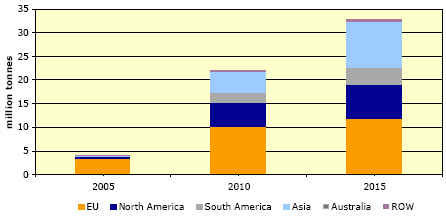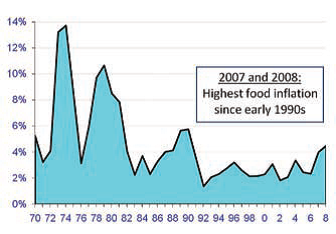Abstract
This report covers the impact of biofuels on the food industry. It shows the rising demands for crops for biofuel production has upset the food system and resulted in higher food prices. Corn and soybeans are in great demands by the biofuel industry because they are the primary sources of biofuels. There is a need for further scientific studies to come with long-term solutions for the food sector and biofuel industry.
Introduction
Background
The biofuel industry emanated from a policy to change the use of fossil fuels for energy production and reduce the emission of greenhouse gases, protect the environment, and support the agricultural sector. Consequently, the biofuel industry has grown significantly in the recent past years.
Many scholars and professionals have argued that the biofuel industry has negatively affected the agricultural sector since biofuels originate particularly from farm produce. Such effects are profound on land usages, environments, and food prices. The increased production of biofuels and the rising demands will result in high food prices. Moreover, there would be a severe shortage of feedstuffs for animal rearing.
At the same time, new feedstuffs will emerge with different nutritional values. Such new feedstuffs will require further reviews and tests to ascertain their qualities. However, some authors have argued that many studies have overstated the impacts of biofuels on the food industry. They claimed that such studies have ignored the fact that by-products from biofuels are also useful in production of animal feedstuffs (Sneller and Durante, 2008; Taheripour, Hertel, Tyner, Beckman, and Birur, 2008).
Purpose Statement
This paper explores the impact of biofuels on the food industry in order to draw a general conclusion with recommendation.
Definition of the Topic
Most of the biofuels mainly come from crops. Consequently, the use of crops to produce ethanol fuels has raised concerns due to some perceived negative impacts on the food industry. The question has been whether the biofuel industry is sustainable amidst competition for feedstuffs for animal production and its noted influences on food prices globally. Critics have raised issues that concern how biofuels will affect food prices and the expected rise in prices over a long period.
Still, some critics have noted that the biofuel industry will create a severe food shortage globally, which could have detrimental impacts on the developing countries as prices will continue to surge. On the contrary, stakeholders in the biofuel industry and crop production have argued that developments in technologies could boost the agricultural sector to allow it to sustain the growing food demands and meet the world’s demand for clean fuels.
The Impacts of Biofuels on the Food Industry
Positive Impacts
The use of by-products from biofuel production
In the production of biofuels, there are feed by-products. These include “Dried Distillers Grains with Soluble (DDGS) and biodiesel by-products (BDBP) such as soy and rapeseed meals” (Taheripour et al.,2008, p. 2). Taheripour et al. (2008) noted that such by-products could be used in the livestock industry as “substitutes for grains and oilseed meals used in the livestock production industry” (p. 2).
As a result, such by-products control and reduce the impacts of the biofuel industry on food prices. Further, they argued that economic models have identified the relevance of incorporating by-products from biofuels. Taheripour et al. (2008) noted that some analysts have failed to account for such benefits in their studies during computable general equilibrium (CGE) analyses.
Taheripour et al. (2008) concluded that prices of feedstuffs (cereal grains) increased steadily in the absence of by-products, but the increment was minimal in the presence of by-products (22.7 % and 14 % respectively between 2006 and 2015). The authors concluded that the price of oilseeds increased by 62.5% in the EU between 2006 and 2015 but it increased by 56.4% in the presence of by-products. Therefore, by-products from the biofuel industry helped in reducing food prices (Doppenberg, 2007).
Increased earnings from crop production
From environmental point of view, the world benefits from clean energy produced from crops. In addition, farmers who receive incentives to produce more corn and soybeans and manufacturers who have ready market for their products also benefit economically.

Negative Impacts
Inflation on food prices
One fundamental concern is to understand how the biofuel industry affects food prices. The main impact of biofuels on the food industry results from surging food prices. These feedstuffs consist of “corn, soybean meal, soybean oil, wheat, barley, and oats” (Alexander and Hurt, 2007, p. 1), which constitute a significant part of food supply. Prices of food depend on the supply and demand.
During the initial stages of the biofuel industry, the demands for corn and soybean oil surged significantly. As a result, the prices for corn and soybean oil increased sharply. Higher prices acted as sources of incentives for farmers to produce more corn and soybean oil by increasing acreage.
As farmers use more acres for the production of crops for biofuels, fewer acres become available for other crops for food and animal production. In turn, the demand for crops for clean energy production also results in higher prices for crops for food and animal production, which also compete for acreages. This implies that consumer food prices will continue to surge as changes in the crop production affect the entire food system (Hertel, Tyner and Birur, 2008).
However, immediate impacts on rising food prices differ based on specific food items. Any changes in the prices of wheat are notable in the price of flour, bread and other bakery products. This also applies to soybean oil prices, which have similar impacts on cooking oils, salad dressings, and other vegetable oil products. However, manufacturers and retailers might be slow to implement such prices changes to consumers.
The major consumers of corn and soybean produce are poultry and livestock. In some instances, there could be immediate responses when food prices rise. For instance, in the fall of 2006 and winter of 2007 when “corn prices moved up sharply, broiler and egg producers quickly responded by reducing production” (Alexander and Hurt, 2007, p. 2).
The impact was immediate on the prices of chicken and eggs, which rose sharply. In the beef market, the number of cattle for feedlots declined, as well as meat weights in the market. Consequently, supplies of beef declined, but followed by higher prices.
Still, hog producers did not notice any immediate rise in prices. Instead, they experienced decline in profit margins as costs of feed rose. On the other hand, the impact was immediate in the dairy sector as prices of milk surged steadily because of high consumption and demands for dairy products globally. Hence, the production of milk became highly profitable for dairy farmers.
To this end, it is difficult to predict how the biofuel industry will affect food prices or how fast they will rise. In case the world food production increases and keeps pace with current demands, the production of biofuels from crop produce will not have any major increment on the prices of food globally.
Although the rising biofuel industry creates several challenges, including competition for food and subsequent high food prices, effective scientific studies and development could alleviate such challenges in the future since science as solved several human challenges.
The possible rise in food prices
There is no expected hyperinflation on prices of feedstuffs as experienced in the early 1970s as indicated in figure 2(National Corn Growers Association, 2007). This might not happen because of the food systems have become global and a shortfall in a single region could be offset by surplus from another region. Hence, critics could have overstated the impacts of the biofuel industry on global food prices.

Conclusion
The rising of the biofuel industry and the use of some crops for the production of clean energy have resulted in the rise of food costs for consumers. At the same time, there has been increased competition for such crops between the biofuel industry and animal production. This has extended to the acreages for crop production for animals and the biofuel industry. Although the prices of food will rise, they will not rise sharply and steadily because the impact could be slow with some feedstuffs.
The overall aim for global agricultural sector should be to establish a balance between crops for the biofuel industry and crops for adequate food supply at favourable prices. In the end, the food industry will be able to compete well with the biofuel industry. However, the prices will likely to remain high for consumers.
Recommendation
Rich nations should adopt favourable policies to promote efficient use of corn and soybeans. They can limit the amount of corn and soybeans for biofuels and develop policies to protect corn and soybeans for human consumption.
Governments should provide subsidies for clean energy. However, they should not neglect other areas that have traditionally depended on corn and soybeans. Subsidies have led to high income for farmers and increased demand for ethanol. However, they have increased costs of food to consumers.
Rich nations may not be able to export corn and soybeans with high prices. On balance, the government can enact policies to restrict usages of corn and soybeans on ethanol production. This would control the rising costs of food. On global warming, it would be prudent to explore alternative sources of biofuels, which do not affect consumers or raise costs of human food.
Further scientific studies and development could help in alleviating food shortage and high prices in the future.
References
Alexander, C., and Hurt, C. (2007). Biofuels and Their impact on Food Prices. Web.
Doppenberg, J. (2007). Biofuels: implications for the feed industry. Wageningen, The Netherlands: Wageningen Academic Publishers.
Hertel, T., Tyner, W., and Birur, D. (2008). Biofuels for all? Understanding the Global Impacts of Multinational Mandates. Web.
National Corn Growers Association. (2007). Understanding the Impact of Higher Corn Prices on Consumer Food Prices. Web.
Sneller, T., and Durante, D. (2008). Issue Brief: The Impact of Ethanol Production on Food, Feed and Fuel. Web.
Taheripour, F., Hertel, T., Tyner, W., Beckman, J., and Birur, D. (2008). Biofuels and their By-Products: Global Economic and Environmental Implications. Web.
Wheaton, B. (2008). Impact of Biofuels on Meat Production. Web.